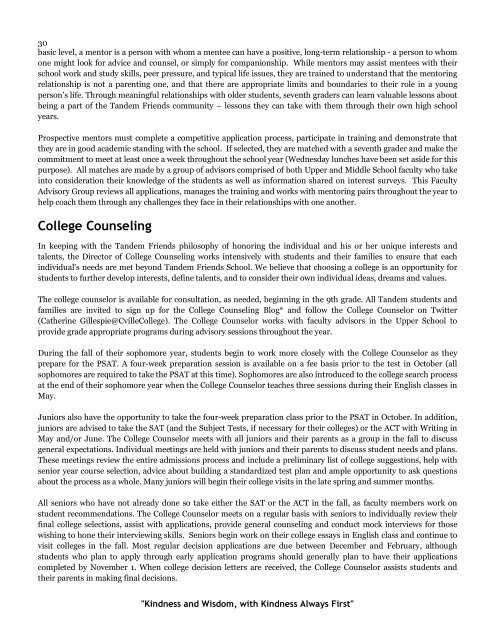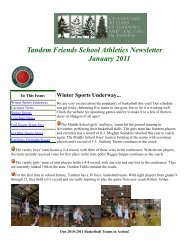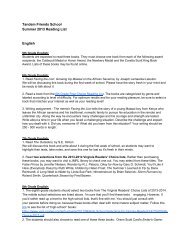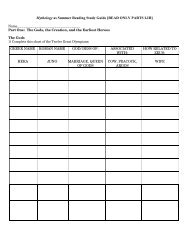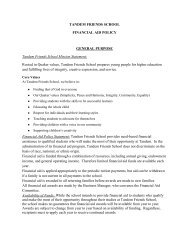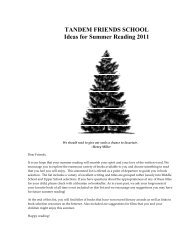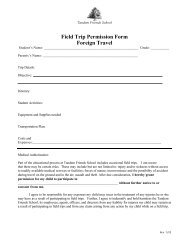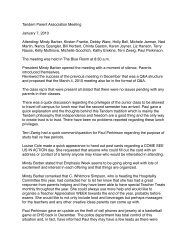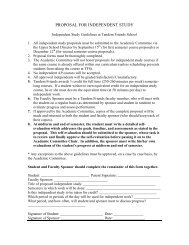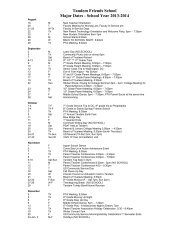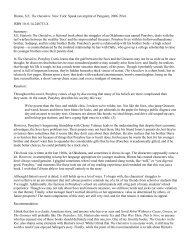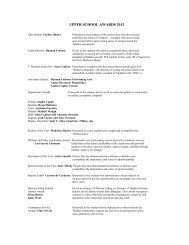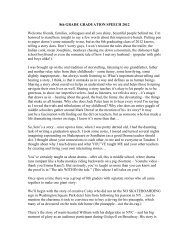Parent & Student Handbook, 2013-2014 - Tandem Friends School
Parent & Student Handbook, 2013-2014 - Tandem Friends School
Parent & Student Handbook, 2013-2014 - Tandem Friends School
You also want an ePaper? Increase the reach of your titles
YUMPU automatically turns print PDFs into web optimized ePapers that Google loves.
30<br />
basic level, a mentor is a person with whom a mentee can have a positive, longterm relationship a person to whom<br />
one might look for advice and counsel, or simply for companionship. While mentors may assist mentees with their<br />
school work and study skills, peer pressure, and typical life issues, they are trained to understand that the mentoring<br />
relationship is not a parenting one, and that there are appropriate limits and boundaries to their role in a young<br />
person’s life. Through meaningful relationships with older students, seventh graders can learn valuable lessons about<br />
being a part of the <strong>Tandem</strong> <strong>Friends</strong> community – lessons they can take with them through their own high school<br />
years.<br />
Prospective mentors must complete a competitive application process, participate in training and demonstrate that<br />
they are in good academic standing with the school. If selected, they are matched with a seventh grader and make the<br />
commitment to meet at least once a week throughout the school year (Wednesday lunches have been set aside for this<br />
purpose). All matches are made by a group of advisors comprised of both Upper and Middle <strong>School</strong> faculty who take<br />
into consideration their knowledge of the students as well as information shared on interest surveys. This Faculty<br />
Advisory Group reviews all applications, manages the training and works with mentoring pairs throughout the year to<br />
help coach them through any challenges they face in their relationships with one another.<br />
College Counseling<br />
In keeping with the <strong>Tandem</strong> <strong>Friends</strong> philosophy of honoring the individual and his or her unique interests and<br />
talents, the Director of College Counseling works intensively with students and their families to ensure that each<br />
individual’s needs are met beyond <strong>Tandem</strong> <strong>Friends</strong> <strong>School</strong>. We believe that choosing a college is an opportunity for<br />
students to further develop interests, define talents, and to consider their own individual ideas, dreams and values.<br />
The college counselor is available for consultation, as needed, beginning in the 9th grade. All <strong>Tandem</strong> students and<br />
families are invited to sign up for the College Counseling Blog* and follow the College Counselor on Twitter<br />
(Catherine Gillespie@CvilleCollege). The College Counselor works with faculty advisors in the Upper <strong>School</strong> to<br />
provide grade appropriate programs during advisory sessions throughout the year.<br />
During the fall of their sophomore year, students begin to work more closely with the College Counselor as they<br />
prepare for the PSAT. A fourweek preparation session is available on a fee basis prior to the test in October (all<br />
sophomores are required to take the PSAT at this time). Sophomores are also introduced to the college search process<br />
at the end of their sophomore year when the College Counselor teaches three sessions during their English classes in<br />
May.<br />
Juniors also have the opportunity to take the fourweek preparation class prior to the PSAT in October. In addition,<br />
juniors are advised to take the SAT (and the Subject Tests, if necessary for their colleges) or the ACT with Writing in<br />
May and/or June. The College Counselor meets with all juniors and their parents as a group in the fall to discuss<br />
general expectations. Individual meetings are held with juniors and their parents to discuss student needs and plans.<br />
These meetings review the entire admissions process and include a preliminary list of college suggestions, help with<br />
senior year course selection, advice about building a standardized test plan and ample opportunity to ask questions<br />
about the process as a whole. Many juniors will begin their college visits in the late spring and summer months.<br />
All seniors who have not already done so take either the SAT or the ACT in the fall, as faculty members work on<br />
student recommendations. The College Counselor meets on a regular basis with seniors to individually review their<br />
final college selections, assist with applications, provide general counseling and conduct mock interviews for those<br />
wishing to hone their interviewing skills. Seniors begin work on their college essays in English class and continue to<br />
visit colleges in the fall. Most regular decision applications are due between December and February, although<br />
students who plan to apply through early application programs should generally plan to have their applications<br />
completed by November 1. When college decision letters are received, the College Counselor assists students and<br />
their parents in making final decisions.<br />
"Kindness and Wisdom, with Kindness Always First"


